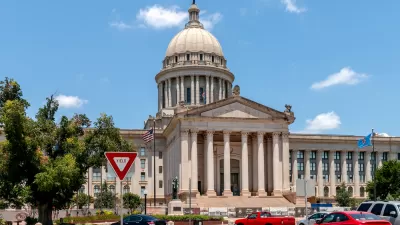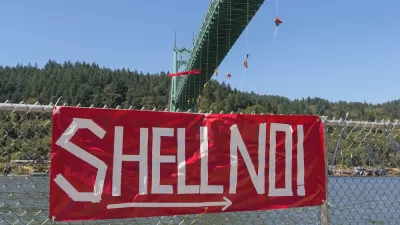Oklahoma is among a number of Republican-controlled states considering gas tax legislation, particularly since it faces a budget gap of $900 million. Bills to hike the tax are expected to be proposed this month, but they face formidable challenges.
Oklahoma's state gas tax of 17 cents per gallon is the nation's third lowest, according to the January 27, 2017 Tax Foundation map. They are only lower in Alaska and South Carolina.
"State taxes on motor fuel haven’t been touched since 1987," reports Joe Wertz for StateImpact Oklahoma. "There are a lot of similarities between the situation then and what Oklahoma lawmakers now face: An economy shaken by low oil prices and dwindling revenue streams to fund state government." [Listen to Wertz's report on SoundCloud].
But last year the budget hole was higher: $1.3 billion, and a minimal gas tax bill by Rep. Earl Sears, R-Bartlesville and state Senator Clark Jolley was soundly defeated in committee on a 14 to 9 vote.
Sears’ three-cent hike on fuel would only have applied when fuel was selling for less than $3 a gallon. Any hike on fuel taxes will likely include such a trigger. Sears expects such legislation to be introduced in the upcoming 2017 legislative session, which starts in February.
“I’ve been told yesterday there’s already a couple of bills,” he says. “I am confident there will be a conversation about raising the gasoline tax.”
And anti-tax activists are ready, pointing to a 2005 initiative petition where "more than 87 percent of voters rejected the proposal to raise the 14-cent-per gallon diesel tax and 17-cent per-gallon gasoline tax to 22 cents each," according to NewsOK.
As for Gov. Mary Fallin's position, this correspondent could only spot her support for hiking other taxes, e.g., cigarette and sales taxes, and expanding e-commerce taxes. Americans for Tax Reform are already expressing opposition.
High Constitutional hurdles
Like California's 1978 Proposition 13, Oklahoma's 1992 State Question 640 sets a high bar for passing tax hikes, reports Wertz in 2014 [listen here].
“You need to have a super-majority in the house and the senate, and the governor has to sign it,” says Alexander Holmes, a Regent’s Professor of Economics at the University of Oklahoma, where he chairs the Economics Department. “You have to have all three parties in order to increase taxes.”
However, "supermajority" means three-quarters with SQ 640, unlike Prop 13's two-thirds. Should the legislature pass the tax increase short of a three-quarters vote, the measure allows a second option : it can be "referred by the legislature to a vote of the people at the next general election and receives majority approval."
As the 2005 initiative illustrated, voter approval will be difficult for a gas tax. The only time voters supported a tax increase was in 2004, but SQ 713 called for replacing a sales tax on cigarettes with a per-cigarette tax of 4 cents.
Oklahoma is not alone
As noted in a post on New Year's Day gas tax changes, Carl Davis, research director at the Institute on Taxation and Economic Policy, points to possible tax increases in Alaska, Louisiana and Tennessee. And legislation to toll Indiana interstates and increase the gas tax has already been introduced.
Low gas prices = increased gasoline consumption?
"Oklahoma led the nation [in gasoline consumption] with the greatest percentage increase of 8.2 percent," notes a November 2016 post. Of course, low gas taxes don't necessary equate with low gas prices. According to Gas Buddy, Oklahoma and Ohio had the nation's fourth lowest gas prices on Feb. 5, averaging $2.063 per gallon, behind South Carolina, Tennessee and Alabama.
Ultimately, it will be up to the Oklahoma legislature, and possibly Oklahoma voters, to decide whether to increase the gas tax this year, even if the tax increase only applies as long as gas prices remain below $3 per gallon, as the provision in last year's bill provided.
FULL STORY: Gas Taxes May Go Up Around The Country As States Seek To Plug Budget Holes

Study: Maui’s Plan to Convert Vacation Rentals to Long-Term Housing Could Cause Nearly $1 Billion Economic Loss
The plan would reduce visitor accommodation by 25,% resulting in 1,900 jobs lost.

Alabama: Trump Terminates Settlements for Black Communities Harmed By Raw Sewage
Trump deemed the landmark civil rights agreement “illegal DEI and environmental justice policy.”

Why Should We Subsidize Public Transportation?
Many public transit agencies face financial stress due to rising costs, declining fare revenue, and declining subsidies. Transit advocates must provide a strong business case for increasing public transit funding.

Paris Bike Boom Leads to Steep Drop in Air Pollution
The French city’s air quality has improved dramatically in the past 20 years, coinciding with a growth in cycling.

Why Housing Costs More to Build in California Than in Texas
Hard costs like labor and materials combined with ‘soft’ costs such as permitting make building in the San Francisco Bay Area almost three times as costly as in Texas cities.

San Diego County Sees a Rise in Urban Coyotes
San Diego County experiences a rise in urban coyotes, as sightings become prevalent throughout its urban neighbourhoods and surrounding areas.
Urban Design for Planners 1: Software Tools
This six-course series explores essential urban design concepts using open source software and equips planners with the tools they need to participate fully in the urban design process.
Planning for Universal Design
Learn the tools for implementing Universal Design in planning regulations.
Smith Gee Studio
Alamo Area Metropolitan Planning Organization
City of Santa Clarita
Institute for Housing and Urban Development Studies (IHS)
City of Grandview
Harvard GSD Executive Education
Toledo-Lucas County Plan Commissions
Salt Lake City
NYU Wagner Graduate School of Public Service





























